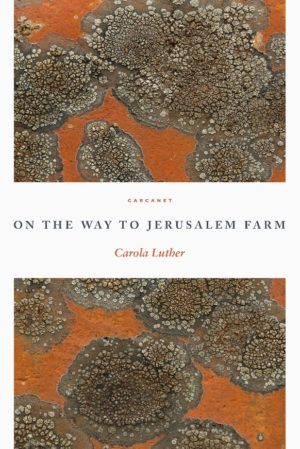On the Way to Jerusalem Farm
by Carola Luther
reviewed by Katie Schmid
Carola Luther’s new book of poems, On the Way to Jerusalem Farm, finds a sense of wonder—albeit a frustrated, aggrieved sense of wonder—in the interconnection of all beings at this perilous moment of human existence. The shapeshifting nature of Luther’s work attests to this interconnectedness. In the very first poem in the book, “Campfire,” cattle’s muzzles float in a trough like “seeds or dust,” and “wait not quite / to drink but to absorb the other.”
Everything in On the Way to Jerusalem Farm is liable to turn into something else, either through grief or longing or just because: cattle “osmose,” a field becomes the “last green flames” of a fire. For Luther, transformation is a precondition of existence—what one is, one cannot persist in being; love ends and lives on, ruminated over forever in memory. At a birthday party, a guest suffering either from old age or dementia asks, after observing some younger partygoers, “could I have been beautiful once? ” Meanwhile,
outside the slow
slow-motion
explosions
of leaf-
green
beech
are coming to perfection and Spring
streams through the window.
The beauty of the trees and the young guests aren’t just set pieces for the tragedy of one woman’s aging; rather, their convergence is the marvel. Luther’s speakers regard the natural world with an E. E. Cummings-like playfulness—as in “Slipping of Light,” where the sun is seen “stroking sheep / half asleep in their wool”—and with seriousness—the same sun travels over the countryside “as if this is it / and there’s no more time.” It lingers, taking its time, “igniting torches stored inside / sheep, birds, trees, the hill, so they might be / their own lamps. This I believe, is similar to love.”
If our time is short—and Luther’s speakers seem to believe it is—we may as well melt languorously into what we find beautiful, what we love. The natural world is breathtaking in these poems, rendered with complexity and musicality. The pastoral here has a desperate edge to it, as in the poem “Today is Blue Like Blue Used to Be.” The speaker stands, bleached in the too-harsh sun, observing the horses and a world slipping through her fingers:
Being human I hope
it might go something like this
When we are finished, first them then us
or maybe the other way roundthere won’t be redemption
exactly, but days of a kind, ugly
and heavenly as this.
Luther falters elsewhere, however. In a description of a heron’s “ponytail, his tribal, inner-city Manchu queue,” the speaker leans on exoticism as a costume piece for adorning the bird. Luther is on firmer footing in “Dawn on Nab Scar,” in which the speaker stands at a lake, reflecting on Luther’s native South Africa and the Sharpeville Massacre, and asks,
Was I implicated? No, yes, where does it begin, and end? A moorhen
is a moorhen, and a coot that swims across glass-still water is also
a pioneer cutting tracks. This one looks as if it wants to separatewater from water, like water is an idea that can be divided from another,
and water will stay separate, grow apart.
The natural world serves as a metaphor for human structures, but I did wonder how much can be gleaned from this metaphor. How alike are human systems of inequality and the animal world? The end of the poem reaches for ecstasy once more, as Luther’s speaker wades into the lake with “[t]wo narrow deer”:
and we slip in and swim, we are lake-ideas, our eyes
pools of brightening water: there is the past and also the future,something oracular about eyes and water, and if I close my deer-touched eyes,
this road below me could be the road to Woodbush
Here, again, Luther’s imagery provides an answer of a kind. The interconnectedness of our lives may not be soothing—more often than not it’s troubling—but it does cause us to ponder, does give us something to be submerged in. Swimming in the lake affords the speaker a moment of ecstatic union, but it also returns her to South Africa and the massacre, and to a tacit acknowledgement of her complicity in the human architecture of death. In the end, the poem offers more bewildered guilt than it does answers.
Luther’s ear is unerring throughout. In “Balance,” a tractor founders in a field and washes up, beaching “In the unharrowed part / sun rilled between bleached-out oat-stalks, / its silvery influx running like water.” It’s those moments of sun-bleached beauty that take place between here and there that I admire most, and Luther’s attention to the indeterminacy of things that I will return to in this collection.
Published on February 22, 2022

